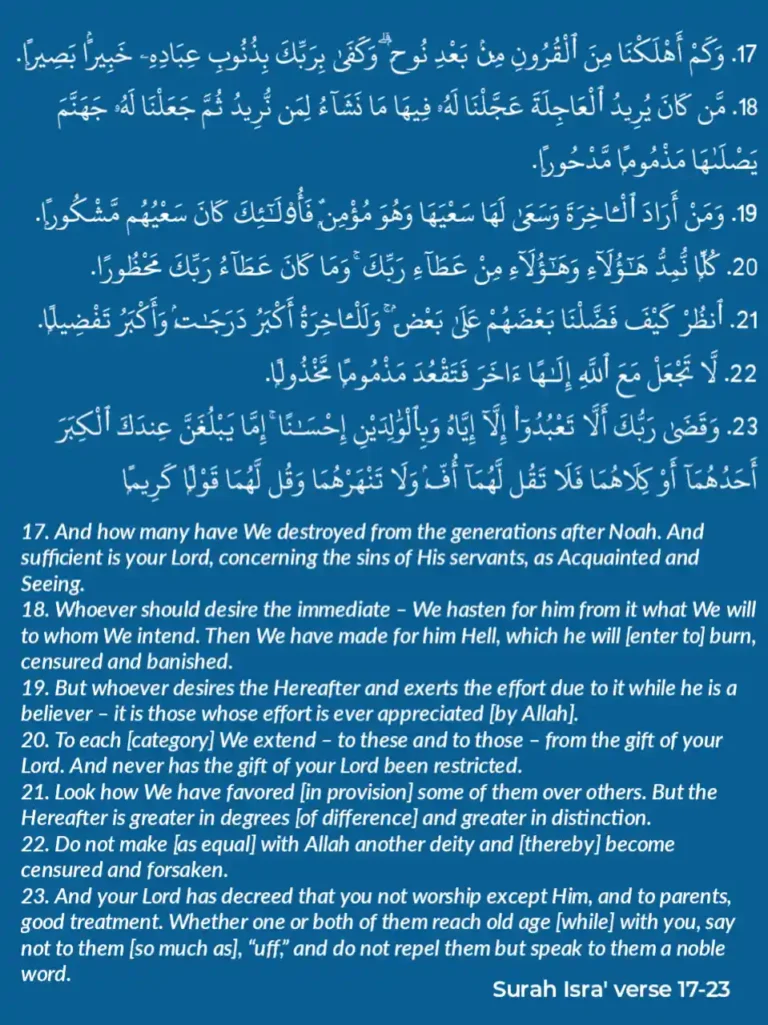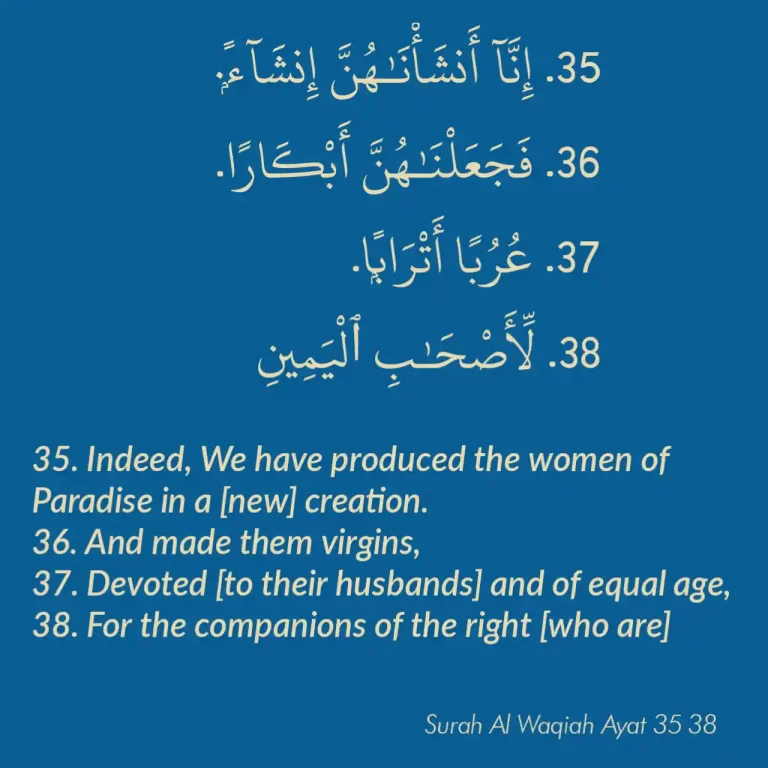Innallaha Ma Sabireen Meaning in English and Arabic Text
Advertisements
Innallaha Ma Sabireen is a Quranic verse which is often recited by Muslims during times of hardship and difficulty, as it serves as a reminder that Allah is always present and supportive of those who remain patient and steadfast in their faith.
In this blog, we will delve deeper into the Innallaha Ma Sabireen meaning and explore its relevance in our daily lives. We will also examine the importance of patience and how it can help us navigate through life’s challenges.
Innallaha Ma Sabireen Meaning in English
The meaning of this verse, Innallaha Ma Sabireen is Indeed, Allah is with the patient.
Innallaha Ma Sabireen in Arabic
Here is the verse in Arabic:
إِنَّ ٱللَّهَ مَعَ ٱلصَّٰبِرِينَ
Advertisements
Innallaha Ma Sabireen verses in Quran
Sabr is mentioned in many places in the Quran and Sunnah of the beloved Prophet Muhammad (ﷺ), which shows the virtues and greatness of Patience. Innallaha Ma asSabireen is mentioned in Surah Baqarah, verse 153, the full verse is:
يَٰٓأَيُّهَا ٱلَّذِينَ ءَامَنُواْ ٱسۡتَعِينُواْ بِٱلصَّبۡرِ وَٱلصَّلَوٰةِۚ إِنَّ ٱللَّهَ مَعَ ٱلصَّٰبِرِينَ
Translation: O you who have believed, seek help through patience and prayer. Indeed, Allah is with the patient.
Another ayat is surah Anfal, verse 46:
وَأَطِيعُواْ ٱللَّهَ وَرَسُولَهُۥ وَلَا تَنَٰزَعُواْ فَتَفۡشَلُواْ وَتَذۡهَبَ رِيحُكُمۡۖ وَٱصۡبِرُوٓاْۚ إِنَّ ٱللَّهَ مَعَ ٱلصَّٰبِرِينَ
Advertisements
Translation: And obey Allah and His Messenger, and do not dispute and [thus] lose courage and [then] your strength would depart; and be patient. Indeed, Allah is with the patient.
- RECOMMENDED READING: Tabarakallah Meaning in English, Arabic Text, And How To Respond
What Is Sabr in Islam?
Lexically, Sabr (patience) means restraint. However technically, it means controlling oneself regarding three things:
- Firstly: Upon obedience to Allah,
- Secondly: From the prohibitions of Allah,
- Thirdly: Over Allah’s preordainments he finds painful.
These are the categories of patience mentioned by the people of knowledge.
The first matter
For the individual to be patient upon obedience to Allah because obedience is heavy on the soul and could be difficult upon the soul.
It may as well be hard on the limbs such that the individual could be feeble and weary. Likewise, it may involve some difficulties in the aspects of wealth such as in the matters regarding the Zakaat and Hajj.
So, acts of obedience may involve some stress for the soul and body, and therefore requires patience and endurance.
Allah the Exalted says:
“O you who believe! Endure and be more patient (than your enemy) and guard your territory by stationing army unit permanently at the places where enemy can attack you.”
Aal-Imraan: 200
The second matter
Patience regarding Allah’s prohibitions by the individual’s avoidance of whatever Allah has forbidden him from.
This is because the Soul Inviting to Evil encourages sins; thus, the individual would restrain his soul.
For instance; lying and cheating in dealings, unlawful consumption of wealth through usury or other means, illicit intimacy, drinking alcohol, stealing and similar other numerous sins.
The individual should hold back himself and not commit these inequities. This certainly requires endurance and restraining the soul and personal desires.
As for the third matter
Patience over the preordainments of Allah he finds painful because Allah’s preordainments may be suitable (for the servant) or painful for him.
Those he finds suitable require gratitude; and giving gratitude is from the acts of obedience.
So, being patient regarding that is from the first category of patience. As for those he finds painful; i.e., they bring discomfort to the individual.
So he may be tested on his body or in his wealth when he loses them. He may equally be tested regarding his family and his community.
The aspects of tests are diverse and they all require patience and endurance.
So, the individual should be patient regarding the things that are prohibited to him such as expressing distress with the tongue, the mind or limbs.
This is because the individual has four conditions during a trial:
The first condition: that he scorns. The second condition: that he is patient. The third: that he is pleased. The fourth: that he is thankful.
These are four states the individual comes in when he is befallen with a trial.
As for the first condition: that he disdains, whether in his heart or on his tongue or with his limbs.
Disdain with the heart is that he nurses some anger and evil thoughts against his Lord – and the refuge is with Allah – and the like.
He feels as if Allah has wronged him with this misfortune.
Regarding the disdain on the tongue: It is for him to invoke ruin and destruction, saying: “Woe upon me, I am ruined!” He may also begin to curse time and insult Allah – the Mighty and Sublime – therewith, and the like.
Concerning the scorn with the limbs; it is such as slapping his cheeks or hitting his head or pulling his hairs or tearing his clothes, and things like that.
This is the state of disdain; the condition of those who are impatient and are, as such, denied the rewards (of patience).
They are not necessarily saved from the misfortune, they rather commit sins therewith.
So, the calamity becomes double for them: the calamity in their religion because of their anger, and the calamity in the worldly affair which brings them pain.
As regards the second condition: being patient over the trial by controlling himself; he dislikes the trials, he does not like misfortunes and he does not love that it happens.
Nevertheless, he restrains himself; he would not utter what displeases Allah with his tongue neither will he employ his limbs to perform any action that angers Allah, and he never nurses any grievance against Allah. He will be patient even though he detests it.
The third condition: Pleasure; the individual is contented with this misfortune. He shows complete pleasure with it as if he was not even afflicted.
The fourth condition: Gratitude; he gives thanks to Allah over it. Whenever the Prophet SAW saw something he disliked, he would say: “Alhamdulillah ‘alaa kulli hal (Praise be to Allah in all conditions)”.
So, he would thank Allah so that Allah writes rewards for him on account of this trial much more than the affliction itself.
It was reported that an ardent female worshipper was afflicted her finger for which she thanked Allah and praise Him.
They asked her, “Why are you thanking and praising Allah when the finger was hurt?” She replied that, “the sweetness of its reward made me forget the bitterness of its patience.”
Allah says: “Only those who are patient shall receive their rewards in full, without reckoning”(Az-Zumar: 10).“
…those who are patient shall receive…” meaning, those who are patient would be given “their rewards”, i.e., their recompense.
His statement: “without reckoning” that is because good deeds are (rewarded) in multiples.
A good deed is rewarded with ten to seven hundred folds of it and greater multiples.
As for patience, its manifold rewards come without measure from Allah, the Mighty and Sublime.
This shows that its reward is great and that it is not possible for the individual to picture this reward since it was not set against a particular number.
It is rather a matter known to Allah alone and is without measure. It cannot be said, for example, that the good deed gives ten to seven hundred rewards; rather it will be said that its reward (i.e. patience) is paid in full without reckoning.
The verse clearly contains encouragement towards patience. And Allah Alone grants success.
From Riyadus Saliheen by Sheikh Uthaimeen.
Advertisements






